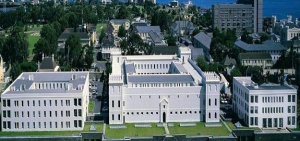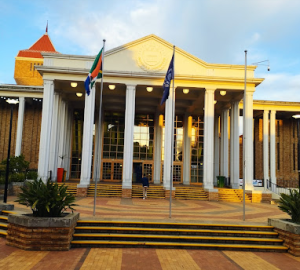The Essentials
Type of Institution: University
Fees per Semester: R30 000 – R100 000
Address: 238 Mazisi Kunene Rd, Glenwood, Durban, 4041, South Africa
Phone Number: +27 31 260 8596
Chancellor: Reuel Jethro Khoza
Vice Chancellor: Nana Poku
Number of students: 45 000+
Website: https://ukzn.ac.za/
Email: enquiries@ukzn.ac.za
Table Of Contents
- Overview
- Contact Details
- Address
- Location
- School Fees
- Courses & Programs
- Vacancies and Entry Requirements
- Logo
- Notable Alumni
- Pros and Cons
- Author’s Review
Overview
The University of KwaZulu-Natal (UKZN) is one of South Africa’s leading academic institutions, formed in 2004 through the merger of the University of Natal and the University of Durban-Westville. It is known for its focus on research, innovation, and excellence in education, offering a wide array of undergraduate and postgraduate programs.
Campuses
UKZN has five campuses located in different regions of the KwaZulu-Natal province:
Westville Campus: Situated in the suburbs of Durban, it houses programs in commerce, law, management, and social sciences.
Howard College Campus: Located in Durban, this campus focuses on engineering, law, and the humanities.
Pietermaritzburg Campus: Offers programs in science, agriculture, and law, with a serene rural setting.
Nelson R. Mandela School of Medicine: Based in Durban, it is dedicated to health sciences and medical training.
Edgewood Campus: Located in Pinetown, it specializes in education studies.
Research and Innovation
UKZN is renowned for its strong focus on research, consistently ranked as one of the top research universities in Africa. It emphasizes innovation across disciplines, particularly in the areas of science, health, agriculture, and engineering. The university’s research output has made significant contributions to South Africa’s knowledge economy.
Research Institutes and Centers
UKZN is home to several research institutes, such as the Africa Centre for Population Health, Centre for Water Resources Research, and the Centre for AIDS Research.
International Collaboration
UKZN is engaged in numerous international research partnerships, collaborating with universities and institutions globally.
Commitment to Transformation and Inclusivity
UKZN is deeply committed to transformation and creating a more inclusive, diverse learning environment. This commitment is reflected in its student population, which represents a wide range of cultural, ethnic, and linguistic backgrounds.
Support for Students
UKZN offers numerous support services for students, including counseling, academic support, financial aid, and career guidance.
Internationalization
The university attracts students from all over the world and has partnerships with several international institutions, enhancing its global presence. UKZN is known for hosting exchange programs, promoting cultural diversity, and contributing to the global academic community.
Community Engagement
UKZN places a high emphasis on community engagement and outreach programs, aimed at addressing societal challenges. The university works closely with local communities on health initiatives, educational programs, and rural development projects.
Key Strengths and Reputation
Ranked among the top universities in South Africa and Africa.
Strong focus on health sciences, engineering, and agriculture.
Highly research-intensive, contributing significantly to scientific advancements in the region.
Known for diversity and inclusivity, fostering a multicultural academic environment.
Emphasis on innovation and sustainability in addressing local and global challenges.
Notable Alumni
UKZN boasts a network of successful alumni who have made significant contributions in various sectors, including politics, business, health, and education.
University of KwaZulu-Natal Contact Details
You can contact University of KwaZulu-Natal via their landline, email or you can visit their website for further contact details.
Phone Number: +27 31 260 8596
Website: https://ukzn.ac.za/
Email: enquiries@ukzn.ac.za
University of KwaZulu-Natal Address
238 Mazisi Kunene Rd, Glenwood, Durban, 4041, South Africa
University of KwaZulu-Natal Location
University of KwaZulu-Natal is located in the city of Durban under the KwaZulu-Natal province of South Africa in the suburb of Glenwood on Mazisi Kunene road.
University of KwaZulu-Natal Fees
University of KwaZulu-Natal ‘s fees is currently standing at R30 000 – R100 000 per semester depending on the program you are studying and the level of degree you are studying. Please contact the institution or visit them to get the latest fees structure as it can change at any term or semester.
University of KwaZulu-Natal Courses & Programs
The University of KwaZulu-Natal (UKZN) offers a wide range of undergraduate and postgraduate courses across various disciplines through its four main colleges.
College of Agriculture, Engineering, and Science (CAES)
Undergraduate Programs:
Agricultural Science: Bachelor of Science in Agriculture (BScAgric), Bachelor of Agriculture (B Agric)
Engineering: Bachelor of Science in Engineering (BScEng) in Civil, Mechanical, Electrical, Electronic, and Computer Engineering
Life and Environmental Sciences: Bachelor of Science (BSc) in Life Sciences, Bachelor of Science (BSc) in Environmental Science
Mathematics and Computer Science: Bachelor of Science (BSc) in Applied Mathematics, Computer Science, and Statistics
Physics and Chemistry: Bachelor of Science (BSc) in Physics and Chemistry
Postgraduate Programs:
Master of Science (MSc)
Doctor of Philosophy (PhD)
Master of Engineering (MEng)
Master of Agriculture (M Agric)
Postgraduate diplomas in various agricultural, scientific, and engineering disciplines
College of Health Sciences
Undergraduate Programs:
Medicine: Bachelor of Medicine and Bachelor of Surgery (MBChB)
Nursing: Bachelor of Nursing (BNurs)
Pharmacy: Bachelor of Pharmacy (BPharm)
Dentistry: Bachelor of Dental Therapy (BDT), Bachelor of Oral Health (BOH)
Allied Health Sciences: Bachelor of Physiotherapy (BPhysio), Bachelor of Occupational Therapy (BOT)
Postgraduate Programs:
Master of Medicine (MMed)
Master of Nursing (MNurs)
Master of Pharmacy (MPharm)
Doctor of Philosophy (PhD) in Health Sciences
Postgraduate diplomas in Public Health, Clinical Medicine, and Medical Sciences
College of Humanities
Undergraduate Programs:
Social Sciences: Bachelor of Social Sciences (BSocSci) in Sociology, Psychology, Political Science, and Anthropology
Education: Bachelor of Education (BEd) for Foundation, Intermediate, and Senior Phases
Arts: Bachelor of Arts (BA) in English, History, Linguistics, Philosophy, and Drama
Religion and Theology: Bachelor of Theology (BTh), Bachelor of Arts in Religion (BA Religion)
Postgraduate Programs:
Master of Social Science (MSocSci)
Master of Education (MEd)
Master of Arts (MA) in Humanities, Languages, and Social Sciences
Doctor of Philosophy (PhD) in Humanities
Postgraduate diplomas in education, arts, and social sciences
College of Law and Management Studies
Undergraduate Programs:
Law: Bachelor of Laws (LLB)
Commerce: Bachelor of Commerce (BCom) in Accounting, Economics, Finance, and Business Management
Public Governance: Bachelor of Administration (BAdmin)
Business: Bachelor of Business Administration (BBA)
Postgraduate Programs:
Master of Laws (LLM)
Master of Commerce (MCom) in Finance, Accounting, and Economics
Master of Business Administration (MBA) through the Graduate School of Business and Leadership
Doctor of Philosophy (PhD) in Law and Management Studies
Postgraduate diplomas in Law, Taxation, Management, and Business Leadership
Cross-Disciplinary Programs
Human Resource Management: Postgraduate Diploma in Human Resource Management
Project Management: Postgraduate Diploma in Project Management
Public Health: Master of Public Health (MPH)
University of KwaZulu-Natal Vacancies and Entry Requirements
The University of KwaZulu-Natal (UKZN) offers a range of undergraduate and postgraduate programs, each with its own set of entry requirements.
Undergraduate Entry Requirements
General Admission Requirements
National Senior Certificate (NSC)
Applicants must hold a South African National Senior Certificate (NSC) or an equivalent qualification.
A minimum score of 30 points on the UKZN points system is required for most undergraduate programs.
Language Requirement: A pass in English at NSC level is mandatory (Home Language or First Additional Language).
Faculty-Specific Requirements
College of Agriculture, Engineering, and Science (CAES):
Mathematics and Physical Sciences are essential subjects for most programs.
Minimum APS of 32 points for programs such as Engineering.
Specific subject requirements (like Life Sciences for Biological Sciences).
College of Health Sciences:
For Medicine (MBChB), students must have high scores in Mathematics, Life Sciences, and Physical Sciences.
Minimum APS of 48 is usually required for admission into the MBChB program.
Nursing, Pharmacy, and Allied Health Sciences programs also require strong performance in sciences, especially Life Sciences and Chemistry.
College of Humanities:
Programs like Bachelor of Arts (BA) or Bachelor of Social Science (BSocSci) require a minimum APS of 30.
Some programs may require specific subjects like History or Languages.
College of Law and Management Studies:
Bachelor of Commerce (BCom) requires a minimum of NSC Mathematics Level 4 and a strong overall APS (around 30).
For Bachelor of Laws (LLB), applicants need to meet a minimum APS of 32 points with no subject lower than Level 3.
International Students
International students must have qualifications equivalent to the South African NSC, such as O-levels or A-levels.
Proof of proficiency in English (IELTS or TOEFL) may be required if the previous education was not conducted in English.
Postgraduate Entry Requirements
Honours Programs
A relevant bachelor’s degree or equivalent qualification.
Minimum 65% average in the final year of undergraduate study.
Specific course or research experience may be required depending on the program.
Master’s Programs
A bachelor’s degree with honours (or a 4-year degree) in a related field.
Minimum average of 65% in the final year of the undergraduate or honours degree.
Applicants may need to submit a research proposal or motivation letter for research-based programs.
Doctoral Programs (PhD)
A relevant master’s degree or equivalent qualification.
A research proposal is typically required for PhD applications.
High academic performance, usually a minimum of 70% in the master’s program.
MBA Program (Graduate School of Business and Leadership)
A bachelor’s degree or equivalent.
At least three years of work experience.
Candidates must take an entrance test and attend an interview.
Some programs may require a personal statement or references.
UKZN Application Process
Application Procedure
Online Applications: Applications for undergraduate and postgraduate programs are submitted via the UKZN online application portal.
Closing Dates:
Undergraduate: Closing dates vary but typically range from June to September each year.
Postgraduate: Varies by faculty; some close by October or have rolling admissions.
Program Vacancies
Vacancies refer to the availability of places in a particular program. Programs such as Medicine (MBChB), Pharmacy, and Engineering are often highly competitive with limited spots.
Admission to high-demand programs may be subject to additional assessments, and applicants with the highest scores and relevant qualifications will be given preference.
Selection Criteria for Competitive Programs
Selection for competitive programs is based on academic merit, performance in specific subjects, and other selection criteria such as interviews or additional entrance tests (for certain health and law programs).
Limited vacancies mean applicants must perform exceptionally well in the relevant subjects, especially in high-demand fields like medicine, engineering, and law.
Financial Aid and Scholarships
UKZN offers several scholarships and bursaries for students based on academic merit or financial need. These include the National Student Financial Aid Scheme (NSFAS) and other university-specific bursaries.
For up-to-date information on entry requirements and vacancies, it is recommended to visit the UKZN Admissions Office or the official website for detailed application guidelines and vacancy announcements for each academic year.
University of KwaZulu-Natal Logo
Below is the logo of University of KwaZulu-Natal with excellent quality and it is available to download in PNG (transparent file) JPEG and PDF.
University of KwaZulu-Natal Logo
University of KwaZulu-Natal Notable Alumni
Tshepo Motsepe – South African physician and businesswoman
Pravin Gordhan – politician and anti-apartheid activist
Malusi Gigaba – Former Minister of Home Affairs of the Republic of South Africa
Constantine Chiwenga – Zimbabwean politician and former army general
Blade Nzimande – South African politician, sociologist, philosopher, educator, anti-apartheid activist and Minister of Higher Education, Science and Technology.
Sihle Zikalala – Minister of Public Works and Infrastructure
Simmy – South African singer-songwriter.
John Smit – World Cup winning South African Rugby Union captain
Imani Sanga – composer and ethnomusicologist
Lize Heerman – singer-songwriter and media personality
Gita Ramjee – scientist and researcher in HIV prevention
Ncoza Dlova – first black dermatologist produced by the university and head of the School of Clinical Medicine
Salome Maswime – global health expert and activist
Mondo Mazwai – legal practitioner and chair South Africa’s Competition Tribunal from 2019
Mosa Moshabela – 11th Vice-Chancellor of the University of Cape Town
Promise Mthembu – HIV/AIDS activist
Nokwanda Makunga – biotechnologist
University of KwaZulu-Natal Pros and Cons
Pros
Diverse Range of Programs: UKZN offers a wide variety of undergraduate and postgraduate programs across multiple disciplines, including Engineering, Health Sciences, Law, Humanities, Sciences, and Agriculture.
Highly Ranked in Africa: UKZN consistently ranks as one of the top universities in South Africa and Africa. It is well-regarded for its academic excellence, particularly in research and innovation.
Research-Oriented Institution: UKZN has a strong focus on research output. It is a leading university for research in areas such as health sciences, environmental sciences, and engineering, contributing significantly to local and global knowledge.
Diverse Student Body: The university is known for its diverse student population, welcoming local and international students from various backgrounds, promoting cultural diversity and global exposure.
Well-Equipped Campuses: UKZN has several modern campuses with well-equipped facilities, including libraries, labs, and IT resources, providing students with the tools necessary for effective learning.
Strong in Health Sciences: UKZN is renowned for its health sciences programs, particularly the Nelson R. Mandela School of Medicine, which produces some of the top healthcare professionals in the country.
Student Support Services: UKZN offers various student support services, including academic counseling, career services, and mental health support, ensuring student well-being and success.
Scholarship and Financial Aid Opportunities: There are numerous scholarships, bursaries, and financial aid options available, making higher education more accessible to students from disadvantaged backgrounds.
Cons
Large Class Sizes: Due to the high demand for its programs, especially in fields like health sciences and engineering, some classes can be quite large, which may limit individual attention from lecturers.
Campus Location and Safety Concerns: While the campuses are well-equipped, certain campuses are located in areas that may experience safety concerns, particularly off-campus areas. Students are advised to exercise caution, especially at night.
Administrative Delays: Some students have reported experiencing administrative inefficiencies, particularly during the application and registration process, where delays and miscommunications can occur.
Intense Competition for Certain Programs: Entry into high-demand programs like medicine, law, and engineering is highly competitive, with limited spaces and strict entry requirements, making it challenging for some students to secure a place.
Infrastructure Maintenance Issues: Like many large institutions, UKZN sometimes faces challenges with infrastructure maintenance, including occasional issues with Wi-Fi, aging buildings, and maintenance backlogs in certain areas of the campuses.
Student Protests: As with many South African universities, UKZN has experienced student protests related to fees, accommodation, and other issues, which can disrupt classes and university activities from time to time.
Accommodation Shortages: There is a limited number of student residences, leading to challenges for some students in securing on-campus accommodation. Off-campus accommodation options can be expensive or inconveniently located.
High Tuition Fees for International Students: While UKZN offers scholarships and financial aid, the tuition fees for international students can be relatively high compared to other universities in the region, which may pose a challenge for students from abroad.
Author's Review
The University of KwaZulu-Natal (UKZN) stands out as a premier institution of higher learning in South Africa and Africa, renowned for its commitment to academic excellence, research innovation, and community engagement.
With its diverse range of programs across multiple disciplines, including health sciences, engineering, humanities, and law, UKZN offers students a comprehensive and well-rounded education.
The university’s emphasis on research and its robust partnerships with international institutions enhance its global reputation and provide valuable opportunities for academic and professional growth.
However, prospective students should be aware of some challenges, such as the competitive nature of admissions for certain programs, potential administrative delays, and issues related to campus safety and infrastructure maintenance.
Despite these challenges, UKZN remains a leading choice for students seeking quality education and research opportunities in a dynamic and supportive environment.
In conclusion, the University of KwaZulu-Natal offers a robust educational experience with a strong emphasis on research, diversity, and community engagement. Its reputation as a top academic institution in Africa is well-deserved, and it continues to provide students with the tools and opportunities necessary to succeed in their academic and professional pursuits.



